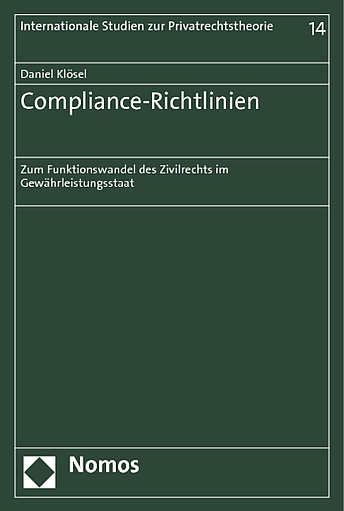englischCompliance guidelines (“Codes of Ethics”) are an established element of transnational corporate governance. Here, the problems related to private regulation become apparent: Although private regulation may be an instrument for reducing the currently existing regulatory deficits of domestic state law, it has on its part substantial legitimacy deficits.
Taking this into account, domestic civil law is subject to a change of its function. To the extent that the challenges connected with the “welfare state” in the 20th century resulted in a “materialization” of the originally formal private law, it is required to meet the challenges of the “cooperative state” in the 21st century by a “proceduralization” which both promotes the regulatory effects of private rules and considers their relation to the public good. Assuming such functional change, the author makes concrete proposals for reforms in the field of Conflict of Laws, the law of contract and the horizontal effect of fundamental rights between private parties, which he formulates by taking as an example the labor law debate on compliance guidelines.
Compliane-Richtlinien gehören zum festen Bestand der transnationalen Unternehmensverfassung. Auch hier zeigt sich die Problematik privater Rechtsetzung, die zwar den aktuellen Steuerungsdefiziten des staatlichen Rechts begegnen kann, im Vergleich dazu aber erhebliche Legitimitätsdefizite aufweist.
Vor diesem Hintergrund unterliegt das staatliche Zivilrecht einem Funktionswandel. Soweit die Herausforderungen des Sozialstaats im 20. Jahrhundert zu einer Materialisierung des ursprünglich formalen Privatrechts geführt hat, muss den Herausforderungen des Gewährleistungsstaats im 21. Jahrhundert durch eine Prozeduralisierung begegnet werden, die sowohl die Regulierungseffekte privater Regeln fördert als auch deren Gemeinwohlbezug in den Blick nimmt. Ausgehend von diesem Funktionswandel macht der Autor konkrete Reformvorschläge im Internationalen Privatrecht, Vertragsrecht und der Grundrechtsdrittwirkung, die er am Beispiel der arbeitsrechtlichen Debatte um Compliance-Richtlinien ausformuliert.


